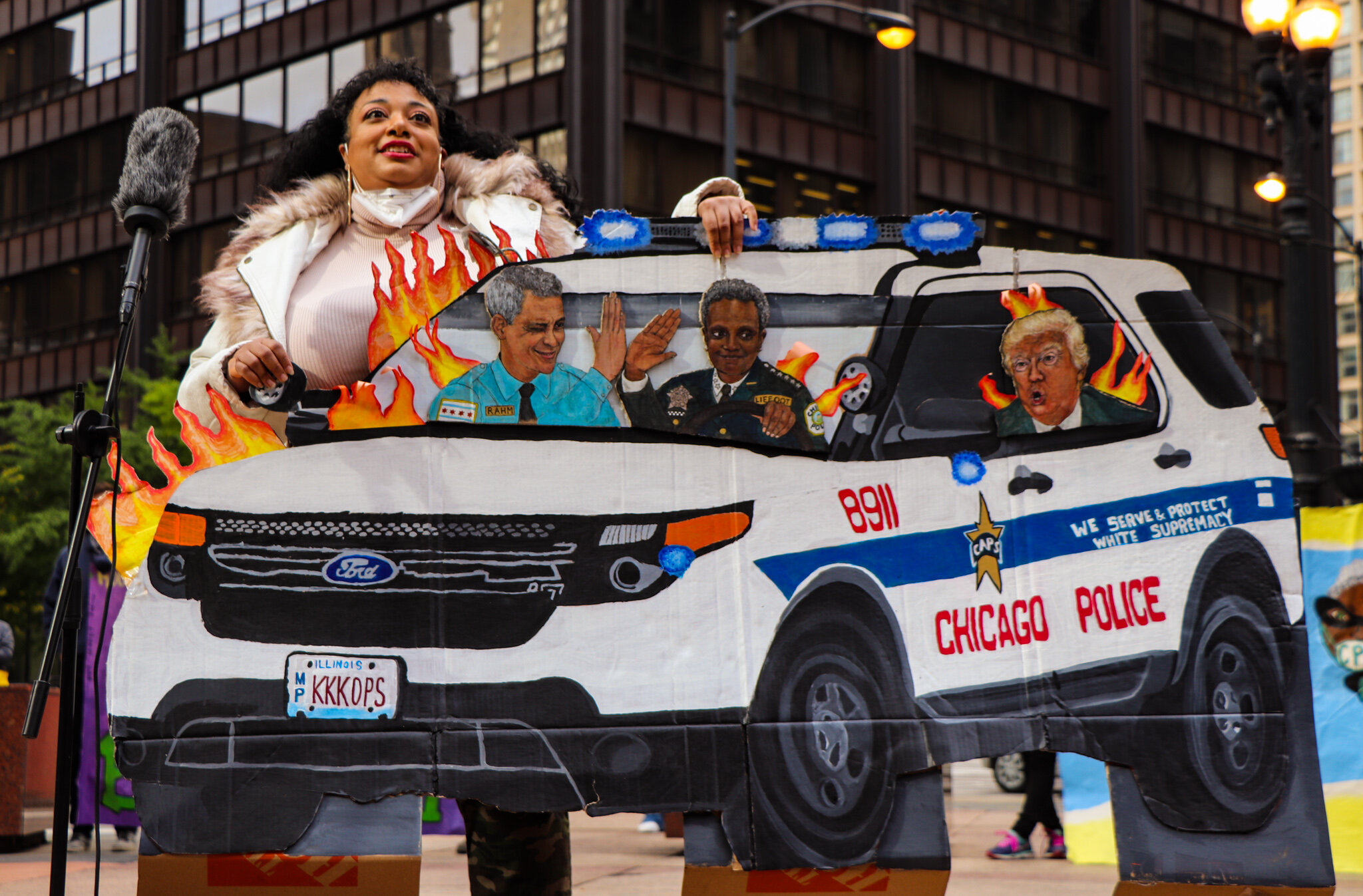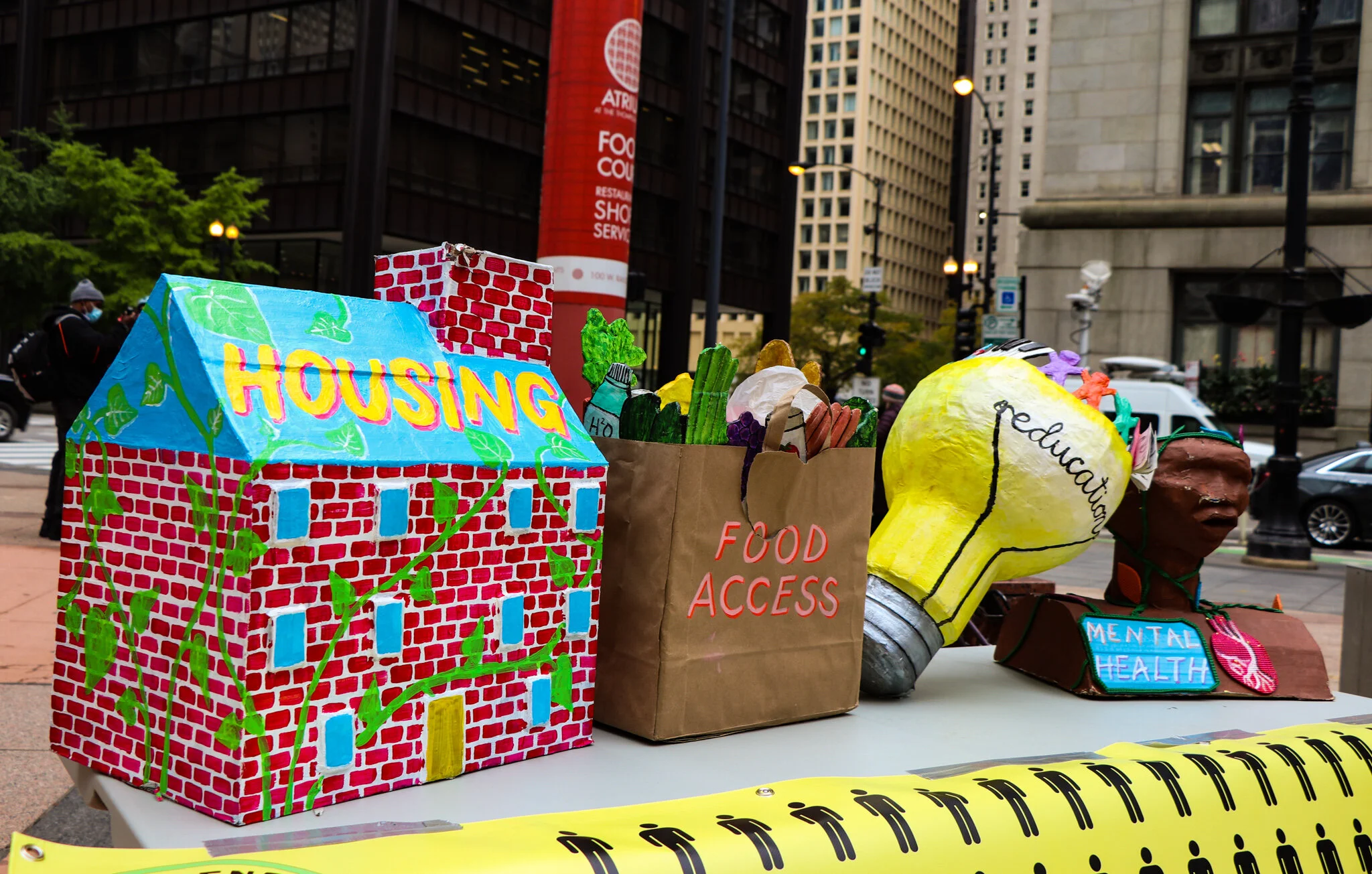Despite a citywide outcry to defund the Chicago Police Department, Mayor Lori Lightfoot rejects major cuts to police budget. ‘She’s not listening,’ protesters say.
By Kelly Garcia, Corli Jay, F. Amanda Tugade and Grace Del Vecchio
Aislinn Pulley addresses the Take Back the Budget action crowd outside the Thompson Center. (Photo: Grace Del Vecchio/City Bureau)
On an island of concrete surrounded by City Hall and the Thompson Center, a group of 50 people gathered mid-morning Wednesday. The rhythmic thumps and brassy horns of the Chicago Soundbox, a five-member band, broke the chilly silence in a once-bustling downtown humbled by the COVID-19 pandemic. A row of bike police, some masked, others not, leaned against a wall and watched the protest.
A speaker and an organizer at the Take Back the Budget protest, Aislinn Pulley, stood outside the center with a megaphone to address the crowd while Lightfoot digitally livestreamed her highly-anticipated plan to fill a $1.2 billion budget hole in 2021 just steps away in Council Chambers at City Hall. Lightfoot has repeatedly dismissed the local campaign to defund and abolish the police, which calls for a public reimagination of safety and community services and has gained momentum during nationwide uprisings after the death of George Floyd. But supporters of this movement see this year’s budget process as their chance for police to be defunded by 75%.
“When we say ‘Defund CPD,’ we aren’t saying that this money is going to be removed from the budget completely,” explained Pulley, a co-founder of Black Lives Matter Chicago and co-executive director of the Chicago Torture Justice Center, to the crowd. “What we’re saying is that this money needs to be redistributed into the communities. This is about redistribution. It is about a reorganization of priorities.”
As she spoke, she held up a painted cardboard police cruiser, in which Lightfoot high-fived former mayor Rahm Emanuel while President Donald Trump hung out in the backseat. People in the crowd waved colorful handmade signs and props painted with slogans like “Take Back the Budget” and “Stop Lori’s Budget Burglary.”
Instead of relying on policemen and prisons to solve societal problems, abolitionists like Pulley want dollars poured into food access, quality public education, housing, mental health clinics and health care. It’s these services—not policing and incarceration—that they say will build healthier and safer communities in Chicago.
What that requires, Pulley said, is “a new social contract, a new agreement between the people and the government, which cuts to the fundamental organization of how society functions.”
Protesters hold a banner behind speakers at the Take Back The Budget action on Tuesday. (Photo: Grace Del Vecchio/City Bureau)
Just across the street at City Hall, the mayor took a different fiscal route.
Alone in City Council chambers, Lightfoot was mid-way through her livestream, unveiling a plan to combat a $1.2 billion budget gap–the largest in Chicago history–amid a second wave of coronavirus cases. She sought to remind residents a “we, not me” mentality is the only way forward.
“During this horrible pandemic, we have shown strength as a city,” she said, “when we have worked together as partners making shared sacrifices and facing the challenges head on.”
Lightfoot’s 2021 budget proposal seeks to close a deficit with a $94 million property tax increase, a 3-cent per gallon gas tax hike and a wave of layoffs and furloughs for thousands of city workers.
It also includes a provision to raise property taxes annually beginning in 2021 and each following year by an amount tied to inflation through the Consumer Price Index. Chicagoans with homes valued at $250,000 would see a $56 increase on their annual property taxes.
The mayor looks to lay off 350 non-union employees and eliminate over 1,000 open positions in various city departments, including some in the Chicago Police Department. Cuts to personnel are expected to save the city about $106 million next year.
Grant funding has also increased significantly, but federal negotiations in the COVID-19 relief bill for 2021 are at an impasse. The proposed 2021 budget includes $2.9 billion in grants including carryover funds from last year related to COVID-19, a nearly 70% increase from 2020. No federal grants related to COVID-19 are included in the proposed 2021 budget so far.
The city also anticipates using $111 million from its current assets for operational expenses and $30 million from its Rainy Day Fund. Several aldermen have urged Lightfoot to propose a bigger financial withdrawal from the city’s rainy day fund, but Chief Financial Officer Jennie Huang Bennett had warned against doing so because “our city’s financial future is uncertain.”
Lightfoot, however, hardly budged when it came to defunding CPD’s nearly two billion-dollar budget in her address. While over 600 vacancies in the police department will be cut, Lightfoot rejected the idea that the city had to choose between investing in the police or communities—even though CPD took up 40% of the 2020 budget.
“On my watch, we will never make cuts or policy changes that inhibit the core mission of the police department, which is to serve and protect us all,” she said.
Overall, the police budget would see a 3.3% decrease—$59 million—from 2020 levels, when the department received $1.6 billion. Lightfoot warned that “literal defunding” would put the city’s “youngest, most diverse and well-trained officers” at risk to lose their jobs and “that is not in anyone’s interest.”
Lightfoot shared more plans to put roughly $5 million into violence prevention and at-risk youth programs. A portion of that funding would support the launch of a 911 co-responder model pilot, where certain calls would be met by trained mental health professionals, community paramedics and crisis intervention team-trained police officers. The mayor also announced that $2 million will be directed toward affordable housing and allotted $7 million for economic recovery efforts to help small businesses.
Throughout Lightfoot’s hour-long speech, she opted to remain hopeful, as the city faces a grim, unpredictable future.
“Our recovery is within reach, working together,” she said in closing. “Together, we can get there, and come out of this crisis better, stronger than ever before.”
Sculptures represent community services which could be funded using the money that is currently going towards the CPD budget. (Photo: Grace Del Vecchio/City Bureau)
While the demand to abolish police in Chicago is not new, it has been given a new light this budget season. Black and brown organizers are building coalitions to pressure the city to strip CPD of funding through its existing budget process. This summer the Black Abolitionist Network created the #DefundCPD campaign, a grassroots effort to take resources and power away from the police and reinvest those funds into communities.
Members of the campaign trained more than 1,500 Chicagoans on police abolition since the summer, canvassing the city and creating social media campaigns to expose the city’s opaque budget process and pressure Lightfoot to make big changes.
The campaign got a huge vote of public confidence when the city released results of its annual budget survey in which 87% of people said they wanted to defund police.
And yet, as Pulley said at the protest Wednesday, “She’s not listening.”
After the budget announcement, the #DefundCPD campaign sent out its own statement: “It is indefensible for the Mayor to ask Black and Brown communities continually brutalized and incarcerated by the police—now struggling to survive a pandemic—to shoulder the burden of a budget deficit through layoffs, furloughs, and regressive taxation while the Chicago Police monopolize almost 40% of the City’s budget.”
Outside the Thompson Center, Chicago Freedom School’s Jermaine “Jayy Jayy” Wright took the mic.
An Auburn Gresham native, Wright stressed the need for school counselors and public mental health services; more collective care and fewer police officers in the 2021 budget. Lightfoot’s proposal wasn’t in line with what he or his community wanted, he said.
And yet, his words echoed the mayor’s own. They both hoped people could put aside their individualism for the greater good; they just didn’t agree on what that greater good should look like. “My aunt told me this thing that’s been stuck in my head: ‘Individualism is the tool of white supremacy,’” Wright remembered. “We’re not thinking about it collectively, and we're not building community through that.”
Nearby, bundled in a black hoodie, Malik Shabazz, a barber from the West Side, leaned against one of the Thompson Center’s rust color and white pillars, after stopping to listen intently to what #DefundCPD protesters had to say. As he took in the mayor’s announcement and the protesters’ demands, he said he felt the city should have closed the budget gap by cutting the police budget and specifically, police officers’ pay.
“Chicago residents should have more to say on their budget. We pay taxes here. We live here. We go through profiling, you know what I'm saying?” said Shabazz.
Instead of police officers who were outsiders in his community, he said he wanted safety to come from people in his neighborhood. It could be led by young people, very much like those speaking that brisk morning outside City Hall, he said.
“I think that we should be able to police our own community. We don't need Chicago PD in our communities,’’ he said.
This story is available to republish under a Creative Commons license. Read City Bureau’s guidelines here.
Support City Bureau’s community-centered reporting by becoming a City Bureau Press Club member today.
To get twice-monthly emails including Chicago news and events, sign up for City Bureau’s Chicago newsletter.



